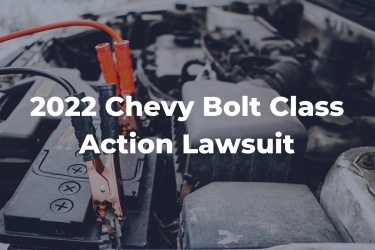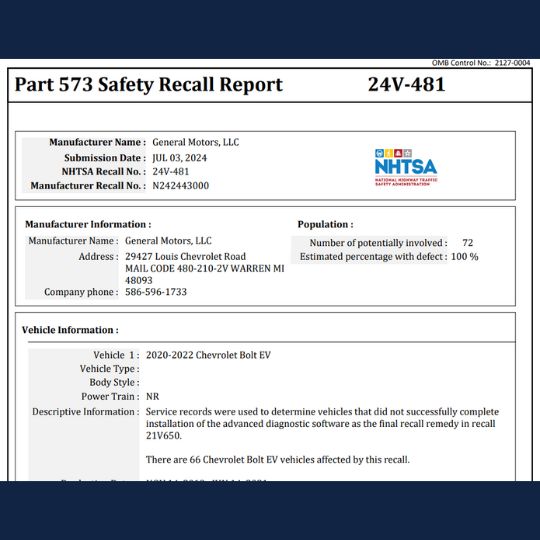
Written By: Jessica Anvar Stotz
Legally Reviewed By: Jessica Anvar Stotz

2022 Chevy Bolt Class Action Lawsuit
A 2022 class action lawsuit is accusing General Motors of selling 2020-2022 model year Chevy Bolt EV and 2022 Chevy Bolt EUV vehicles that are unsafe and likely to catch on fire.
Over three recalls, GM has instructed drivers to limit the battery charge to 90 percent, not let the remaining range drop below 70 miles, supervise the vehicle while it is charging, and to not park the vehicle close to fire hazards.
According to the suit, GM’s “warning that consumers should not charge the Vehicles past 90% drops the advertised mileage capacity from 259 to 233.10 miles.
Taking into consideration that consumers cannot allow the miles remaining on the Vehicle to fall below 70 miles, the battery range falls further to 163.10 miles – that is, 62.97% of the advertised mileage.”
In January 2024, the NHTSA announced a Seatbelt Pretensioner Recall (22V930), also identified as manufacturer recall N222383791. This recall addresses safety concerns in specific Chevrolet Bolt EV vehicles manufactured from 2017 to 2023. Issued on December 15, 2022, the recall addresses the risk of fire near the B-pillar following a crash where the seatbelt pretensioner deploys, potentially igniting nearby carpet fibers.
Approximate Compensation You Could Get for Your Chevy Bolt
| Affected Vehicle | Average Lemon Law Settlement |
| 2022-2023 Chevrolet Bolt EUV | $57,575 |
| 2020-2023 Chevrolet Bolt EV | $60,865 |
*Please note, the figures presented in the chart are approximations based on past case results and should not be interpreted as a prediction or guarantee. Each case is unique and requires personalized legal guidance.
Chevy Bolt EV and EUV 2024 Recalls
In June 2024, GM announced a High Voltage Fire Detection Recall to address possible risk of fire in certain 2020-2022 Chevy Bolt EV and EUV vehicles (GM recall number N242443000). GM’s service records show that the advanced diagnostic software recall fix outlined in NHTSA Recall 21V650 may not have been properly implemented across this group of vehicles. The NHTSA filing for recall 24V-481 was updated in July 2024.

Chevy Bolt Recall: A History of Fires
GM issued its first recall of the Chevy Bolt in November 2020. At that time, the recall included over 50,000 2017-2018 and certain 2019 Chevy Bolt EV vehicles. The reason for this recall was that the high voltage battery is at risk of catching on fire when the vehicle is charged to full or near full capacity.
At that time, GM knew of 5 cars that had caught on fire. GM told consumers to reprogram the hybrid propulsion control module and keep their cars charged at 90 percent. They warned owners to park their vehicles outside until the software update was completed.
GM announced a second recall on July 23, 2021. This affected nearly 69,000 2017-2019 Chevy Bolt EV cars. This recall included vehicles that were previously recalled, because again, the Chevy Bolt lithium-ion battery is fire-prone when at full or near full charge. At this time, GM determined that 10 car fires were the result of faulty batteries.
On October 18, 2021, General Motors expanded the Chevy Bolt recall to all 2017-2022 Chevrolet Bolt EV and 2022 Bolt EUV cars, totaling the number of recalled Bolt vehicles to about 141,000. The auto company identified at least 3 injuries and 13 fires linked to two defects in the batteries. GM claimed that the risk of fire is “rare” because two defects must both be present in the battery module for the vehicle to catch fire: a torn tab and a folded separator.
Included in the recall fix is a software update that will allegedly monitor batteries for any issues. Additionally, GM advised owners and lessees of 2017-2018 Chevy Bolts that have not been repaired yet, to keep their battery charge at 90% using Hilltop Reserve mode. Those who own or lease 2018-2022 Chevy Bolt cars were told to use Target Charge Level mode.
GM also repeated past recommendations to drivers about limiting the car’s charge, parking vehicles outside after charging, among others. The auto company went so far as to advise owners and lessees to park their vehicles at least 50 feet from others.
Chevy Bolt Consumer Concerns
There are numerous complaints regarding battery problems in Chevy Bolt vehicles. Many owners and lessees are extremely concerned about the safety hazards their cars pose.
Others are frustrated by GM’s suggestions. They say that monitoring the car while it is charging for hours or parking far away from fire hazards is unreasonable and makes their vehicles unusable.
“My wife and I were awakened by a loud bang originating from outside the house. I investigated and noted a police officer outside my home using a fire extinguisher on my 2019 Chevy Bolt. I saw flames coming from the right passenger side… The fire spread to the house. At some point the Fire Department arrived and extinguished the fire, but not before the car was completely consumed and significant damage was done to our home.”
– Chevy Bolt Owner
“GM has a final remedy that involves analyzing the battery for defective modules and installing advanced diagnostic software to detect performance issues before they cause a problem. The huge problem with that remedy is that there have been two fires in cars that had their batteries analyzed and had the diagnostic software installed. That means their system for detecting and preventing fires DOES NOT WORK.”
– Chevy Bolt Owner
“Even when it is not charging, the Bolt is still very close to my garage, main bedroom, and house. In addition, I live near the mountains in the foothills. It is a high fire danger area. If something happened to the Bolt, it could cause a lot of damage to my neighbors and the surrounding area.”
– Chevy Bolt Owner
“We were alerted that the Bolt was on fire. We discovered smoke billowing out of the rear of the Bolt and the Bolt apparently combusting from within, in the battery cells. The Fire Department was contacted and took approximately 3 hours to control the fire and smoke. The Fire Department evacuated us, our downstairs neighbors, and both units of the home next door during the fire.”
– Chevy Bolt Owner
Contact the Chevy Lemon Law Experts Today
GM’s solutions to the battery problem are insufficient and burdensome. Chevy Bolt drivers purchased vehicles that they thought were safe and convenient to drive, only to be told that they are prone to battery fires and cannot utilize the full mileage that was advertised.
Additionally, Bolt owners nationwide are having difficulty attaining replacement parts for their cars. GM does not appear to be in any rush to address these issues, despite the apparent safety risk. If you have had little luck with your Chevy Bolt or any other GM vehicle, contact us for a quick and confidential assessment. We understand that going up against a large auto manufacturer can be daunting, and we are here to help you throughout this process.
The Lemon Law Experts will begin by evaluating your case and determining if you qualify for cash compensation, a refund, or a replacement vehicle. We believe that you deserve to drive a vehicle that you can feel safe in, and our lemon law firm will do everything we can to make that happen. The automakers and their attorneys know the hard work and exceptional level of detail we put into every case.
Contact us online or call (877) 885-5366 today.




